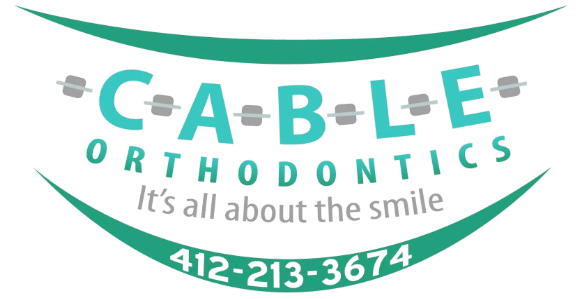FAQs
Cable Orthodontics
Have an orthodontics-related question? Cable Orthodontics has the answer. Check out these FAQs and give us a call today for a free initial consultation!
-
Why choose Cable Orthodontics?
We take a personalized approach to your orthodontic care; you see the same faces every time you visit the office. We personalize the care for each patient. We are highly involved in the community and consider our patients an extension of our family. Our dedication to our patients makes us the orthodontist office Pittsburgh, PA residents prefer.
-
What is orthodontics, and what do orthodontists do?
Orthodontics is a specific field of dentistry that helps to prevent and treat dental and facial abnormalities such as crooked teeth and bad bites. An orthodontist is a specialized dentist who is equipped with the skills necessary to move teeth into the correct positions and enhance dental facial growth and development. If you're interested in orthodontic treatment, contact Cable Orthodontics to schedule an appointment at the orthodontist office Pittsburgh, PA residents love.
-
What are the benefits of orthodontics?
Some of the possible benefits of orthodontic care include:
- A more beautiful, straighter smile.
- More confidence in your appearance.
- Improved function of the teeth and bite.
- Better dental hygiene and dental health for the gums and teeth.
- Less wearing of the teeth.
- Decreased chance of injury to front teeth that protrude from the mouth.
To experience these benefits firsthand, contact our orthodontist office in Pittsburgh, PA to schedule an appointment.
-
Do I need braces?
According to New Mouth, approximately 4 million people in the U.S. have braces. Some key signs that you may need dental braces in Pittsburgh, PA include:
- You have protruding front teeth.
- Your upper teeth are either covering or behind your lower teeth when you bite down.
- Your teeth do not meet when you close your mouth.
- The center teeth are not aligned.
- You have spaces between your teeth.
-
Is there an age limit to visit an orthodontist?
You can begin receiving orthodontic care at any age. The earlier that problems are detected, the better chance you have at correcting them before they create major problems. We recommend that children see an orthodontist around the age of seven, and in our professional experience, most orthodontic care is performed between the ages of nine and 14. As long as your gums and teeth are in good condition, then you can receive orthodontic treatment as an adult without any problems. Contact our orthodontist office in Pittsburgh, PA today to learn more about your treatment options.
-
How does orthodontic treatment work?
There are many different types of orthodontic treatments that can be used. The most common treatment is braces. Braces place gentle pressure on your teeth in order to shift them into the right position and create a perfectly straight smile. To get started with dental braces in Pittsburgh, PA, schedule an appointment with Cable Orthodontics today.
-
How long do I have to wear braces?
The duration of the treatment varies from case to case. We've found that the average treatment time for dental braces in Pittsburgh, PA is from one to three years. Variables include how often you visit the orthodontist, whether you are taking care of your teeth, how your treatment is progressing, how your teeth respond to the treatment, and so on.
-
Will braces hurt my teeth?
No, they only help. The first time you have your braces put on, you may feel some sensitivity and soreness around your teeth and gums, which is normal. Afterward, your mouth will become accustomed to having the braces, and you will no longer feel any sensitivity or irritation. Don't hesitate to reach out to Cable Orthodontics if you have any further questions about dental braces in Pittsburgh, PA.
-
Will braces interfere with my life?
No. Getting dental braces in Pittsburgh, PA may require some adjustments, but your braces will not interfere with your life. If you play sports, it is recommended that you wear a mouth guard to prevent injury to your mouth, teeth, and braces in case you are hit in the face. In terms of playing wind instruments, you will be able to play with some minor adjustments. You can even purchase brace covers to help you with the transition and prevent any discomfort that you may feel.


Share On: